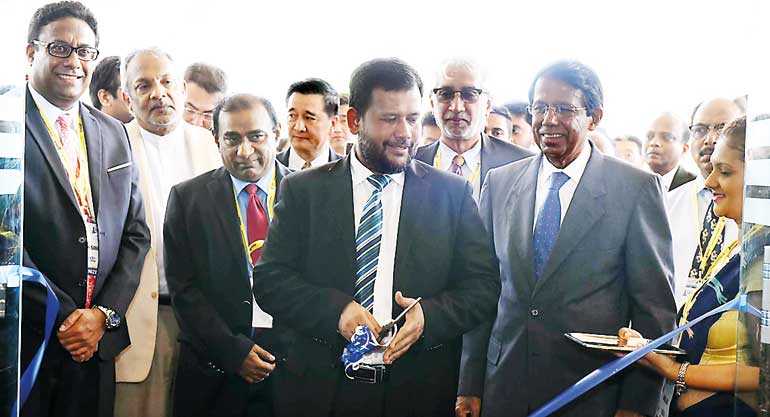Thursday Feb 12, 2026
Thursday Feb 12, 2026
Saturday, 30 June 2018 01:07 - - {{hitsCtrl.values.hits}}

Sri Lanka’s construction sector is increasingly played by Foreign Direct Investments (FDI), rather than locally-generated funds. The main reason: The sector’s annual output value is now totalling to a huge $ 3 billion, without even counting the value of mega projects such as the Colombo Port City of Hambantota Port-related constructions.
“The Sri Lankan construction sector has become increasingly responsive to our FDI flows,” said Minister of Industry and Commerce Rishad Bathiudeen on Friday, addressing the launch of the seventh edition of the construction industry exhibition ‘Construction Expo 2018’ at BMICH.
Sri Lanka’s premier construction exhibition bringing together both local, international suppliers and service organisations in the building, construction, engineering and architecture industries is a collaborative effort of Lanka Exhibition and Conference Services Ltd. and Ceylon Institute of Builders (CIOB) and ends on 1 July.
‘Green building’ is a major theme at this year’s expo. Over 240 local and international vendors, including 20 Indian companies by the Export Promotion Council of India (at India Pavilion) and 30 Chinese firms in the Chinese pavilion (mostly from Liaoning Province – China’s industrial and steel province) are displaying a wide spectrum of construction products, services and information for the local construction sector.
A China Liaoning-Sri Lanka Business Forum was also held on the sidelines of this expo opening at BMICH on 29 June.
Liaoning Province Commerce Department Section Chief Qyu Wanliang addressing the Forum said that Sri Lanka was an important stopover of China’s One Belt One Road (OBOR) and an important trade partner of China.
“Liaoning-Sri Lanka total trade in the first five months of this year was $ 51 million. Liaoning Province believes it has opportunities to partner with Sri Lanka’s economy, which is growing steadily,” he said.
“Though Sri Lanka’s construction sector declined somewhat in the first three months of this year by 5%, it still has an important place in our economy at 7.4% in our GDP,” said Bathiudeen, adding, “This is a larger share than our agricultural sector.”
“More importantly this sector has increasingly become responsive to our FDI flows. The sector grew by 6.6% in 2014 but thereafter slowed down recently, syncing with somewhat weaker FDI inflow to Sri Lanka. Construction Expo 2018 will therefore be a great step and in fact the much-needed promotional effort that this sector urgently calls for. I commend the organisers and all the stakeholders for their commitment in highlighting our construction sector’s capacities to the international, local participants and visitors especially at a time when such an event is really needed to uplift it.”
Ceylon Institute of Builders (CIoB) President Dr. Rohan Karunaratne was even more forthright on the FDI impact on the Lankan construction sector and said: “CIOB has given a new lease of life to our construction sector, which has become very competitive due to foreign contractors. At present almost 40% of Sri Lankan construction projects have been taken up by Chinese firms. The China International Contractors Association (CHINCA) is bidding and winning them. These projects are other projects apart from the Port City and Hambantota Port area-related projects.
“In the next three years CHINCA wants to increase its stake in the Sri Lankan construction industry to 70% of total projects. This can be detrimental to our local firms. As a result, the Construction Chamber of Sri Lanka has signed a MoU with CHINCA to share all their projects here with Lankan construction firms so that the risk is mitigated. We have also moved a Cabinet paper that all such projects by foreign firms from any country should have a Sri Lankan partner from now on.”
CIoB’s Dr. Karunaratne added that the total output value of Sri Lankan construction industry in 2017 was now estimated at a huge $3.03 b (Rs. 480 billion). “This is without even adding the values of such mega projects as the Colombo Port City or Hambantota Port-related constructions; then imagine how big the total values are when you add all these,” he said.